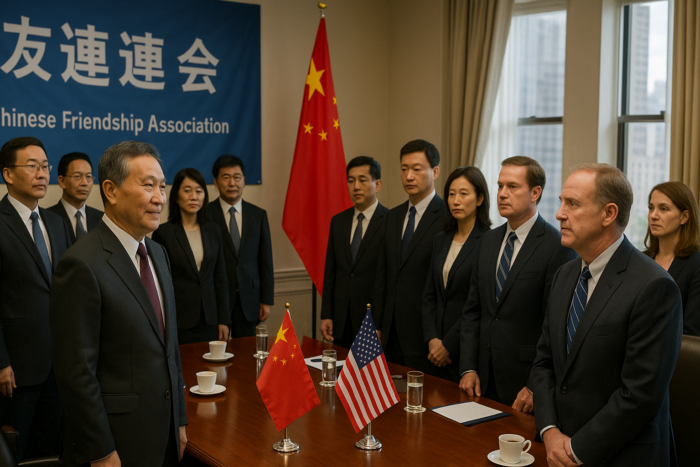Jonathan Powell, Sir Keir Starmer’s national security adviser, held talks with a Chinese organization that US security officials previously warned was involved in foreign influence operations, eight months before he was appointed to his government role. On 7 October 2025, The Telegraph reported that Powell met with the Chinese People’s Association for Friendship with Foreign Countries in Beijing in March 2024, an organization that the US State Department had warned was tasked with co-opting subnational governments. The article begins:
Sir Keir Starmer’s national security adviser met with a “malign” Chinese organisation months before he entered the Government. Jonathan Powell held talks in Beijing with the Chinese People’s Association for Friendship with Foreign Countries (CPAFFC) in March 2024, eight months before he was appointed as the Prime Minister’s top aide on national security matters. The US state department issued an alert about the organisation in 2020, warning that it had been tasked with “co-opting subnational governments” and had “sought to directly and malignly influence state and local leaders to promote” China’s global agenda. In 2022, the US National Counterintelligence and Security Centre also said that CPAFFC was involved with “foreign influence operations” tied to the Chinese Communist Party (CCP).
Key Points
- The US State Department issued an alert about CPAFFC in 2020, warning it had been tasked with co-opting subnational governments and sought to directly and malignly influence state and local leaders to promote China’s global agenda.
- The US National Counterintelligence and Security Centre said in 2022 that CPAFFC was involved with foreign influence operations tied to the Chinese Communist Party and was entrusted to develop sister relationships that pressured organizations to sever ties with entities the CCP deemed problematic.
- Powell is understood to have chaired a Whitehall meeting in September to discuss whether Britain could describe China as an enemy in a collapsed espionage case without upsetting diplomatic relations with President Xi Jinping.
- The Telegraph revealed Powell quietly visited Beijing in July to hold talks with Wang Yi, his Chinese counterpart, as part of a trip only reported by Chinese state media, and has made at least three further visits to China since August 2023.
China’s Influence Operations in the UK: Elite Capture, Parliamentary Infiltration, and Academic Penetration
Chinese influence operations in the United Kingdom have evolved into a sophisticated multi-layered challenge targeting British institutions through elite networks, parliamentary infiltration, academic partnerships, and media manipulation. Security agencies publicly identified Christine Lee, a prominent London lawyer, as engaged in long-term political interference activities linked to the United Front Work Department, with MI5 warning that she facilitated over £400,000 in donations to Labour MP Barry Gardiner while her son worked in his parliamentary office. The MI5 alert represented an unprecedented public disclosure identifying an individual as a Chinese agent, demonstrating heightened concern about covert political manipulation targeting politicians across party lines.
Beyond individual agents, Beijing has cultivated institutional vehicles for influence. The 48 Group Club serves as China’s primary mechanism for elite capture in Britain, gathering former Prime Minister Tony Blair, members of the House of Lords, and senior business executives who interact with Chinese Communist Party operatives, including former ambassadors and vice-ministers. The organization publishes content from Chinese state media outlets and its members openly advocate for Beijing’s policy objectives, exemplifying how China deploys business networks to shape elite opinion. The United Front system operates through friendship associations and student groups that pressure university administrators to cancel visits from critics like the Dalai Lama and censor artwork critical of CCP actions in Xinjiang, demonstrating China’s ability to constrain academic freedom on British campuses.
China’s influence extends into digital and academic spheres with alarming scope. The government has funded British YouTubers through Chinese Radio International to produce pro-China propaganda videos with titles like “Western media lies about China” and “Camera surveillance is great in China,” exploiting social media platforms to shape public opinion. Meanwhile, UK universities have conducted nearly 1,400 joint studies with Chinese scientists in militarily sensitive fields—more than any other European nation—as part of what researchers describe as a well-thought-out strategy to advance China’s technological, economic, and military power. This academic collaboration raises serious questions about knowledge transfer that could enhance Beijing’s capabilities while British institutions remain vulnerable to Chinese influence.
The UK’s response has been notably constrained despite documented threats. When Britain introduced its Foreign Influence Registration Scheme in January 2025, China remained conspicuously absent from the “enhanced tier” requiring comprehensive activity declarations, despite Parliament’s Intelligence and Security Committee having found in 2023 that China engaged in aggressive interference targeting British academia and politics. Conservative MPs criticized this exclusion, arguing that it prioritizes economic links over national security. In contrast, the registration scheme places only Russia and Iran under the most stringent monitoring requirements, reflecting the delicate balancing act that British policymakers face between economic engagement with China and protecting democratic institutions from foreign manipulation.
External References:
- Intelligence and Security Committee of Parliament — China Report 2023
- MI5 warning about influence efforts of British-Chinese lawyer marks changed tone — France 24
- 48 Group Club — Wikipedia
Disclaimer:
The Global Influence Operations Report (GIOR) utilizes AI throughout the posting process, including the generation of summaries for news items, introductions, key points, and, often, the “context” section. We recommend verifying all information before use. Additionally, all images are generated using AI and are intended solely for illustrative purposes. While they represent the events or individuals discussed, they should not be interpreted as real-world photography.









